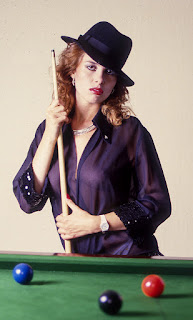Improving Your Photography
The Devil is in the Detail
Passing on the knowledge and experience you've gained can be
very helpful. The obvious beneficiary is the receiver, however there is huge
potential for the giver to also learn and better understand things. Working and
talking with people at earlier stages of the photographic path have enabled me
to trace and chart my own journey. It's brought me a clearer view of where I've
been, and hopefully how I wish to move ahead. Many times I have recognised
myself in what people are doing and thinking as they progress and it's
interesting to see if they will come to the same conclusions and realisations
that I did or move in a different direction.
 One thing that recently became apparent to me is the level
of detail with which I tend to look at an image. Upon reflection it's something
I've automatically done for quite a while. This picture was taken ages ago
on a medium format camera using a waste level finder (which will flip the image
back to front). As I was setting up the shot I was carefully checking the edges
of the frame through the finder to ensure none of the pictures on the wall were
in shot. I suddenly became aware of the model and her friend we're giggling.
Puzzled I found out that whilst I was busy checking the edges, her blouse had
fallen open revealing everything and I'd never noticed!!!
One thing that recently became apparent to me is the level
of detail with which I tend to look at an image. Upon reflection it's something
I've automatically done for quite a while. This picture was taken ages ago
on a medium format camera using a waste level finder (which will flip the image
back to front). As I was setting up the shot I was carefully checking the edges
of the frame through the finder to ensure none of the pictures on the wall were
in shot. I suddenly became aware of the model and her friend we're giggling.
Puzzled I found out that whilst I was busy checking the edges, her blouse had
fallen open revealing everything and I'd never noticed!!!Starting out
When we start out, in photography our minds are necessarily
full of the technical side, and the overall picture. This is especially true
when working with people, where there is the added pressures of interacting
with the subject. However, over time, as we learn and develop our craft, much
of that starts to become automatic and we are able to focus more and more on
the details of the picture. Much can be done to free up our attention during a
shoot, especially by pre planning. For example, whilst it is important to be
able to take advantage of unexpected things that come up during a shoot, having
some initial plan of action as to lighting, looks, etc saves you having to be
thinking about what you are going to do next, and keeps a session flowing.
Look at the whole picture
So what should you be looking for during the shoot? One of
the most common faults that stands out for me, is lack of attention to the
background. It's easy to get so caught up in the main subject that what is
behind gets overlooked. Poles, branches, signs, I've even seen a picture with a
fence post that was behind, but between a models legs and seemed to be
disappearing up under her skirt!!! They are all things that once spotted can
usually be easily corrected by a slight change of viewpoint. Other distractions
can often be moved, such as in another recent fashion shot with a pile of
discarded boxes in the corner. Even when your unable to move yourself or an
object, it's often possible to throw the background out of focus, and as a last
resort there is always Photoshop!
Moving back to the main subject, there are loads of
potential details that can be overlooked. In the case of a person, things like
clothes not sitting well, labels showing, stray hair, etc can become
distracting. Also check for unwanted creases in the skin, and awkward or
distorted limbs. For other subjects, make sure they are free from, (or shoot to
hide) blemishes, watch for unwanted reflections, and try to ensure there is
nothing out of keeping with the overall image.
Get it right before you start
As previously mentioned, a lot of work can be done prior to
the shoot by planning and making sure everything you need is in place and
suitable. I recently saw picture of a model as a 30s style gangsters moll.
Obviously quite a bit of planning had been applied. The models hair, makeup,
clothes etc were great. She was posing by an old car from the time, in a
similarly old fashioned garage with old signs etc. Everything was in place for
a potentially great shot. ... And then she was holding a small, plastic, obviously
toy, machine gun! All that other effort, and for me, the whole picture was
ruined by that little lack of attention to detail. Why even bother with a gun
if a decent replica one was not available!
In my mind the ability to focus on and manage the minor aspects
of an image, whilst at the same time maintaining the overall picture, is what
can lift many photographs from competent to excellent. The ability to view and
recognise possible faults, and areas that could be improved, in your own (and
others) images, is the best tool to keep you moving forward in the development
of your skills.





Comments
Post a Comment